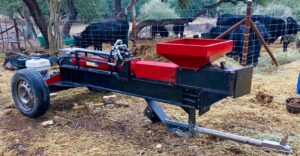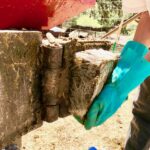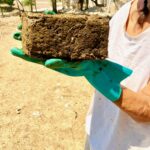
Chris recently served as a technical advisor to Rose Marie Belforti on her recent NE-SARE funded project to demonstrate a hydraulic press used to make fuel briquettes from manure and bedding. The machine, dubbed the “Biomass Beast” by Rose, was built for $5,766 and Rose demonstrated production of briquettes at a rate of 90 dry pounds per hour for 3 cents per dry pound. The briquettes were found to have 6,481 BTU/lb (at 10.5% moisture content) which compared favorably to dry cord wood (e.g. 5,649 BTU/lb for sugar maple at 10% moisture). They burned easily and well. All in all, the cost of production and the heating value suggests that these briquettes deliver energy at a cost of about $4.4 per million BTU (roughly the equivalent of $105 per cord of firewood or $0.60 per gallon of fuel oil).

Rose Marie Belforti was interested in finding ways to manage excess livestock manure on her small farm. She learned that manure fuel briquettes have been used on small farms by many cultures around the world for centuries, but typically they have been made by hand and do not have the energy content (BTUs) suitable for modern heating needs. Biomass fuel briquette machines currently on the market in the U.S. are designed for large production and are not practical for small farm use. Therefore, Belforti sought to design and test a prototype of an affordable hydraulic press scaled for small farm use that would sufficiently compress a mixture of raw manure and bedding mixture into brick form to be used as a heating fuel.
She was able to test the idea out with the support of a Farmer Grant project funded by the Northeast Sustainable Agriculture Research and Education Program (SARE). Belforti received the SARE Farmer Grant in 2017 to design and construct a hydraulic press to form fuel briquettes from livestock manure and to test them.
Belforti worked closely with a local welder, Steve Lonsky, and also with technical advisor Chris Callahan (UVM Extension Ag Engineer) to develop the press prototype. She then tested different ratios of fresh manure, bedding (straw and wood shavings), and water to come up with a recipe that would press and dry efficiently and have reasonable density. Briquettes were analyzed for quality and heat value. Compared to cordwood, livestock manure pressed briquettes rated well for BTUs per pound; however, ash content was higher than cord wood or wood pellets which means more frequent cleanout would be required.

The press cost $5,766 ($2,103 in materials and $3,662 in fabrication labor) to construct which included all new materials except for tires. The cost could be considerably less if on farm equipment already in hand would have been used. One could also, with welding skills, modify a wood splitter to have a dual purpose machine. A typical briquette size is: 7” high x 9” wide x 9” long. The dry weight is approximately 3 lbs for a briquette that size. Belforti was able to produce 90 lbs of dry briquettes per hour. Drying is done in ambient conditions, protected from rain, using the heat of the sun (e.g. in a greenhouse) with some ventilating air flow. The cost of fuel to run the machine is about 3 cents per pound of dry briquette.
The fuel testing demonstrated “dry” moisture content of about 10.5% using simple, passive techniques with some ventilating air flow but and no supplemental heating. The briquette fuel was tested for heating value and was found to have 7,673 BTU/lb (moisture free). This equates to 6,841 BTU/lb (at 10.5% moisture). Ash content was relatively high at 18%.
Combining the cost of production and the heating value suggests that these briquettes deliver energy at a cost of about $4.4 per million BTU (roughly the equivalent of $105 per cord of firewood or $0.60 per gallon of fuel oil). The amortized cost of the machine and labor is not included in these early cost estimates.

Based on results of the project, Belforti concluded that livestock manure briquettes can be a feasible fuel source for the small farm, particularly those with surplus livestock manure. Photos of the press and construction information as well as fuel analyses are available on FarmHack (http://www.farmhack.net) and are included in the final project report, available on the SARE website (https://projects.sare.org/sare_project/fne17-862/)
